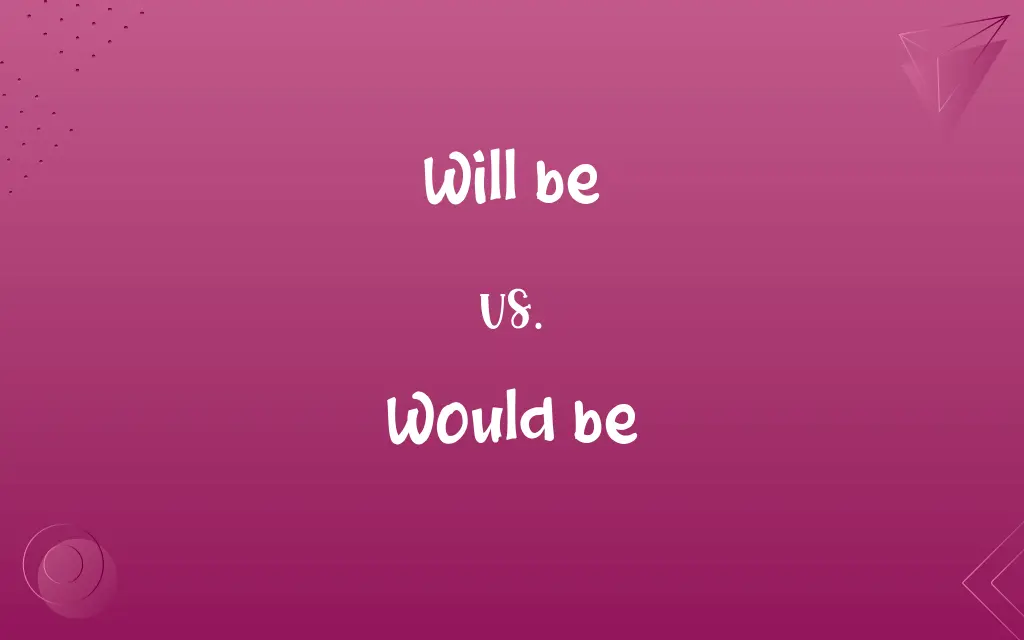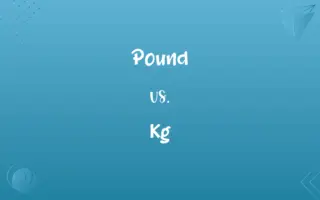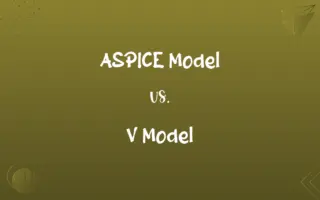Will be vs. Would be: Know the Difference

By Shumaila Saeed || Published on February 21, 2024
"Will be" indicates a future action or state, expressing certainty or intent, while "would be" denotes a conditional or hypothetical situation.

Key Differences
"Will be" is used to express a definite action or state that is expected to happen in the future. In contrast, "would be" is used to express a hypothetical condition, often dependent on another event that might or might not happen.
Shumaila Saeed
Feb 21, 2024
"Will be" conveys a sense of certainty about future events or states. On the other hand, "would be" implies a sense of uncertainty, used for situations that are imaginary, wished for, or conditional.
Shumaila Saeed
Feb 21, 2024
In usage, "will be" is straightforward for making future predictions or plans, like "The meeting will be tomorrow." Conversely, "would be" is used in more speculative scenarios, such as "It would be nice to meet tomorrow, if possible."
Shumaila Saeed
Feb 21, 2024
"Will be" is also used to express a willingness or determination, for example, "I will be there for you." In contrast, "would be" is used to express politeness or a hypothetical preference, like "I would be happy to help, if needed."
Shumaila Saeed
Feb 21, 2024
Another context where "will be" is used is in first conditional sentences, indicating a high probability of the event occurring, as in "If it rains, the event will be canceled." Whereas "would be" is used in the second and third conditional sentences, which are more speculative or unlikely, for instance, "If I had a million dollars, I would be very happy."
Shumaila Saeed
Feb 21, 2024
ADVERTISEMENT
Comparison Chart
Use in Sentences
Indicates future actions or states.
Indicates conditional or hypothetical actions.
Shumaila Saeed
Feb 21, 2024
Degree of Certainty
Conveys certainty or intent.
Implies a hypothetical or uncertain scenario.
Shumaila Saeed
Feb 21, 2024
Example Contexts
Future predictions, plans.
Imaginary, speculative situations.
Shumaila Saeed
Feb 21, 2024
Expression
Used for expressing determination or willingness.
Used for expressing politeness or preference.
Shumaila Saeed
Feb 21, 2024
Conditional Sentences
Used in first conditional (real possibility).
Used in second/third conditional (less likely).
Shumaila Saeed
Feb 21, 2024
ADVERTISEMENT
Will be and Would be Definitions
Will be
"Will be" is used to indicate a future occurrence.
The store will be closed on Sunday.
Shumaila Saeed
Jan 17, 2024
Would be
"Would be" is used to express polite offers or wishes.
Would be okay if I join you?
Shumaila Saeed
Jan 17, 2024
Will be
"Will be" indicates a future action or state.
The concert will be held next week.
Shumaila Saeed
Jan 17, 2024
Would be
"Would be" is used for hypothetical situations.
It would be great to travel the world.
Shumaila Saeed
Jan 17, 2024
Will be
"Will be" is used for expressing future certainty.
She will be the next team leader.
Shumaila Saeed
Jan 17, 2024
ADVERTISEMENT
Would be
"Would be" expresses a conditional action or state.
I would be happy to assist you.
Shumaila Saeed
Jan 17, 2024
Will be
"Will be" expresses future plans or intentions.
We will be meeting at 10 AM.
Shumaila Saeed
Jan 17, 2024
Would be
"Would be" indicates a potential future in specific conditions.
She would be a good leader if she were more confident.
Shumaila Saeed
Jan 17, 2024
Will be
"Will be" denotes a future event or condition.
It will be sunny tomorrow.
Shumaila Saeed
Jan 17, 2024
Would be
Desiring, attempting, or professing to be
"Would-be home buyers will have a somewhat easier time getting loans" (Wall Street Journal).
Shumaila Saeed
Jan 17, 2024
Would be
Attempting or desiring something.
Would-be marines have to get through a rigorous examination.
Shumaila Saeed
Jan 17, 2024
Would be
Unfulfilled; frustrated in realizing a goal, ambition, etc.
Would-be film stars often become waitresses.
Shumaila Saeed
Jan 17, 2024
Would be
Desiring or professing to be; vainly pretending to be; as, a would-be poet.
Shumaila Saeed
Jan 17, 2024
Would be
"Would be" denotes imaginary or speculative scenarios.
That would be the perfect solution if it works.
Shumaila Saeed
Jan 17, 2024
Repeatedly Asked Queries
Can "will be" and "would be" be used interchangeably?
No, they serve different purposes in a sentence.
Shumaila Saeed
Feb 21, 2024
How is "will be" used in a sentence?
It's used for expressing future events with certainty.
Shumaila Saeed
Feb 21, 2024
How is "would be" used in a sentence?
It's used for hypothetical or conditional statements.
Shumaila Saeed
Feb 21, 2024
What does "will be" mean?
"Will be" refers to a definite future action or state.
Shumaila Saeed
Feb 21, 2024
Is "will be" used in conditional sentences?
Yes, primarily in first conditional sentences.
Shumaila Saeed
Feb 21, 2024
What does "would be" mean?
"Would be" refers to a conditional or hypothetical action.
Shumaila Saeed
Feb 21, 2024
Is "would be" used in conditional sentences?
Yes, especially in second and third conditional sentences.
Shumaila Saeed
Feb 21, 2024
Is "will be" appropriate for formal writing?
Yes, it's suitable for both formal and informal contexts.
Shumaila Saeed
Feb 21, 2024
In what context is "would be" commonly used?
In speculative or imaginary scenarios, and polite expressions.
Shumaila Saeed
Feb 21, 2024
Can "will be" indicate willingness?
Yes, it can express determination or willingness.
Shumaila Saeed
Feb 21, 2024
What type of sentence typically uses "will be"?
Sentences about definite future plans or predictions.
Shumaila Saeed
Feb 21, 2024
How does tense affect "will be" and "would be"?
"Will be" is future tense, while "would be" is conditional mood.
Shumaila Saeed
Feb 21, 2024
Can "would be" express past habits?
Yes, in the form of "used to" for past repeated actions.
Shumaila Saeed
Feb 21, 2024
Can "will be" express predictions?
Yes, it's often used for making predictions about the future.
Shumaila Saeed
Feb 21, 2024
Is "would be" used in indirect speech?
Yes, particularly in reported conditional statements.
Shumaila Saeed
Feb 21, 2024
Can "would be" express regret?
Yes, especially in the context of unreal past situations.
Shumaila Saeed
Feb 21, 2024
Does "would be" imply uncertainty?
Yes, it implies a less certain, hypothetical situation.
Shumaila Saeed
Feb 21, 2024
Can "would be" be used to make polite requests?
Yes, it's often used to make polite offers or requests.
Shumaila Saeed
Feb 21, 2024
Can "will be" be used to express habits?
No, it's not typically used for habitual actions.
Shumaila Saeed
Feb 21, 2024
Are "will be" and "would be" used in questions?
Yes, both can be used in interrogative forms.
Shumaila Saeed
Feb 21, 2024
Share this page
Link for your blog / website
HTML
Link to share via messenger
About Author
Written by
Shumaila SaeedShumaila Saeed, an expert content creator with 6 years of experience, specializes in distilling complex topics into easily digestible comparisons, shining a light on the nuances that both inform and educate readers with clarity and accuracy.








































































